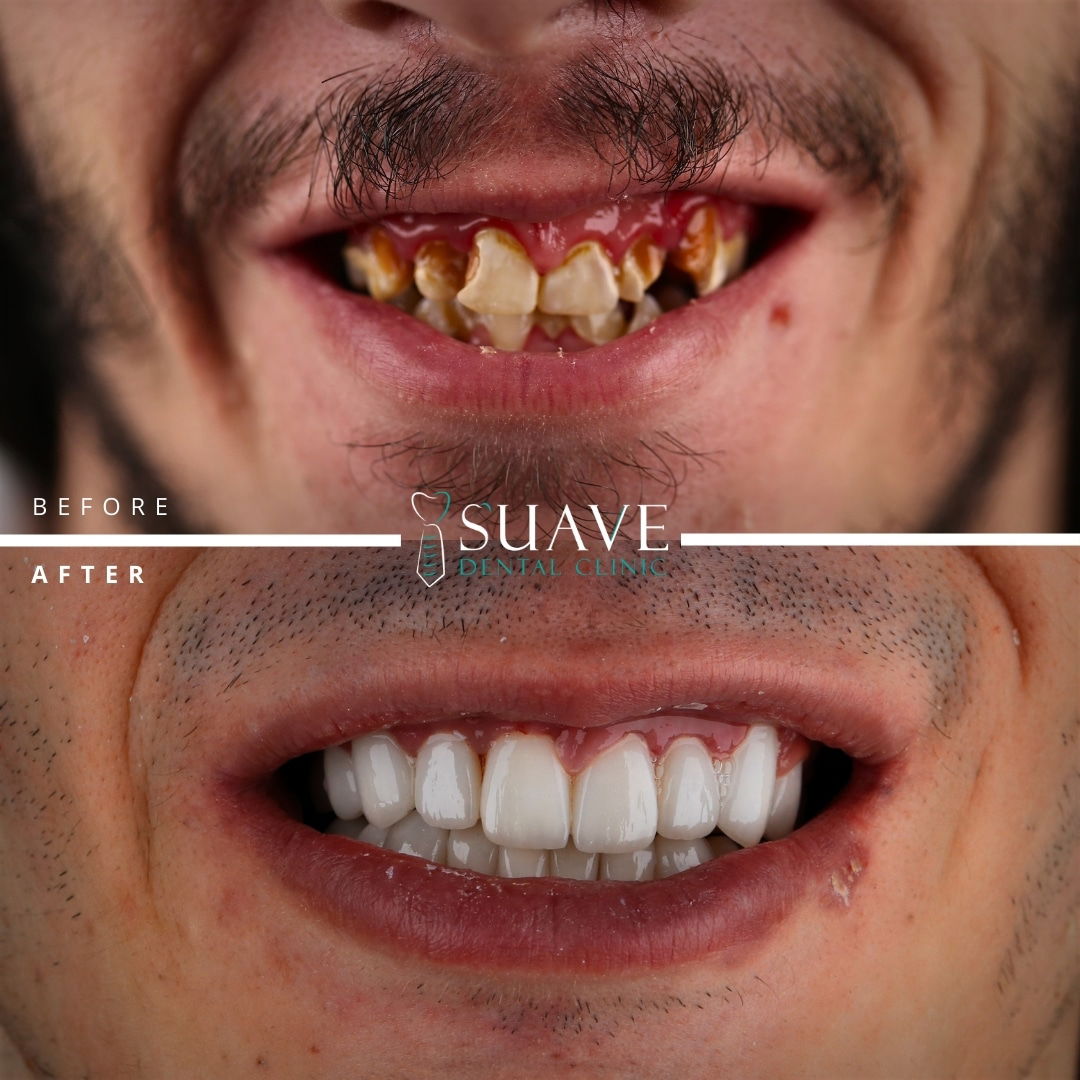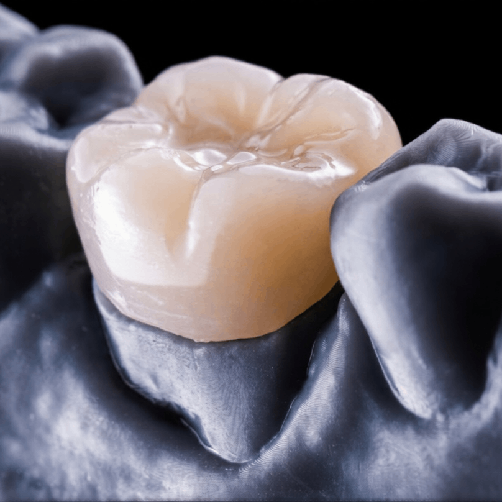Table of Contents
A dental crown is a guaranteed solution for fragile, liable to fracture, root canal-treated teeth, or even in complete mouth rehabilitation. It’s a very common and effective procedure for restoring damaged teeth for long-lasting strength, functionality, and aesthetics.
If you’re considering getting a dental crown at Suave Clinic, we provide you with a thorough guide to help you make an informed decision about your dental health.
What Are Dental Crowns?
They are full-coverage tooth-shaped caps (or hats), permanently cemented to the remaining tooth structure, and cover the visible part of the tooth, which is the tooth crown. Its main purpose is to restore the strength, function, longevity, and aesthetic appearance of the previously damaged tooth.
What Are The Benefits of Dental Crowns?
- Restoring functionality: dental crowns help restore the functionality of damaged teeth, regaining the normal mastication process, which includes chewing and biting.
- Protection of weak teeth: Crowns help protect teeth that are weakened by decay, fracture, malformation, large filling, or teeth with pulp therapy.
- Improving Esthetics: They enhance the appearance of teeth by covering the damaged teeth, the large dental filling, discolored or misshapen teeth, and severely worn-down teeth.
- Restoring missing teeth: a dental crown is the primary unit of the dental bridge (Fixed Partial Denture), which is used to restore one or more missing teeth by relying on neighboring sound teeth.
- A prosthesis attached to the dental implant:
The dental implant post is securely attached to the bone, and then a dental crown is screwded or cemented to the implant, both are the fixed restoration of a missing tooth/ teeth. - Full mouth crowns: if patients have multiple teeth decayed, a full mouth reconstruction with Emax or zirconia crowns may be the only treatment plan that restores esthetics and functionality.

Who Needs Dental Crowns?
People indicated to have dental crowns are those with :
- Teeth with extensive caries and large decay that can’t be filled with a dental filling.
- Teeth with excessive wear, such as teeth grinding and clenching.
- A tooth with root canal treatment must be covered for more protection.
- Teeth fractured or compromised with extensive micro-cracks
- Teeth Malocclusion and need restoration and bite adjustment.
- malformed teeth; too small teeth like peg-shaped lateral, wide spacing between teeth, buck teeth, or shark teeth
- teeth with excessive interdental spaces and need cosmetic enhancement (can’t be resolved with dental veneers only)
- teeth with excessive gum recession where soft tissue grafting with cosmetic gum surgeries is not appropriate.
- Restorations on dental implant abutments (the visible crown above the gum on the implant )
Types of Dental Crowns
All the materials used in dental crowns are bio-inert materials, and don’t cause any allergic reactions, such as :
- Porcelain-fused-to-metal crowns (PFM crowns)
- Zirconia crown
- All ceramic crowns (most famous: IPS EMAX monolithic or layered)
- All metal crowns (pediatric crowns for children with primary teeth )
- Gold Crowns (not applicable anymore unless you are a fan of gold grills like “Lil Wayne”)
- Resin and acrylic crowns (used as Temporary crowns)
Advantages And Disadvantages of Dental Crowns By Material
| Type of Dental Crown | Pros | Cons | Material Used | Suitable For |
|---|---|---|---|---|
| Metal Crowns |
|
| Gold, palladium, chromium-cobalt alloys | Molars or non-visible teeth; patients needing high durability and strength with no care of esthetic or natural-looking teeth. |
| Porcelain-Fused-to-Metal (PFM) Crowns |
|
| Metal base with a porcelain layering | Front and back teeth need both strength and a natural appearance |
| All-Ceramic/Porcelain Crowns E-max Crowns |
|
| Lithium disilicate, CAD/CAM Ceramic blocks Feldspar porcelain, the most famous material, is IPS EMAX Ceram. | Front teeth or visible areas where appearance is crucial; are not ideal for patients with bruxism |
| Zirconia Crowns |
|
| Monolithic Zirconia: IPS EMAX ZirCAD. Layered Zirconia with porcelain. High Translucent Zirconia | Molars or any teeth requiring high strength and durability; patients looking for a blend of durability and appearance. |
| Resin Crowns |
|
| Composite resin | Temporary crowns; patients on a budget; not recommended for long-term use |
What are the Safest Types of Dental Crowns?
All Ceramic crowns, including E-max, Empress, and zirconia crowns, are biocompatible materials that don’t interact with the oral environment and don’t cause hypersensitivity reactions. Once a person is diagnosed with metal allergy, he/she should inform their dentist to avoid using any metal material, including porcelain-fused-to-metal crowns, which in this case is not an option anymore, and all the available now are All-Ceramic Crowns.
Dental Crown Procedure at Suave Clinic
Getting a dental crown typically involves two to three visits to the dentist if no further dental procedure is needed. Here’s a step-by-step breakdown of the process:
First Visit: Initial Examination and Tooth Preparation
Second Visit: Crown Placement
Cost of Dental Crowns in Turkey
One of the significant advantages of getting dental crowns in Turkey is the cost savings. Dental treatments in Turkey are considerably more affordable compared to Europe and the USA due to lower overhead costs and competitive pricing.
At Suave Clinic, we offer patients on dental tourism an affordable package system according to the type of dental crown suitable for the patient’s case, and also according to whether the patient needs further dental procedures like tooth build-up, dental filling, calculus cleansing, and plaque control to receive efficient dental crowns that are high in function and high in durability.
We offer affordable prices not only from Europe and the USA but from all over the world. Contact us to learn more about our packages and deals at Suave Clinic.
Book A Customized Dental Crown and Bridge Treatment Plan
Dental Crowns Post-Treatment Recovery
After receiving a dental crown, it’s crucial to follow the dental crown aftercare instructions to ensure dental crown longevity and durability
- Avoid Hard and Sticky food for a few days after receiving the crown.
- Avoid Smoking and alcoholic beverages for a few days after receiving the dental crown to avoid any gum / gingival irritation.
- Oral Hygiene is a must. Keep brushing and flossing to avoid any plaque accumulation and gum disease.
- Avoid any chewing bad habits that could lead to crown fractures, like pin biting, ice chewing, etc.
- Regular dental checkups.
What to consider after the dental crown procedure?
While dental crowns are a reliable restorative option and the most efficient solution for preserving a damaged tooth and restoring its function, shape, and durability, they are not without potential drawbacks:
- Tooth Sensitivity: Some patients may experience sensitivity to hot or cold temperatures after the crown placement. And this usually subsides after a few days to a few weeks post-treatment. Patients could have OTC pain killers like Ibuprofen to manage this sensitivity discomfort.
- Chipping or Cracking: Although rare, cheap ceramic or porcelain crowns can chip or crack, especially if exposed to excessive force, bad chewing habits, or hard foods.
- Too High points of the crown in the patient’s mouth: in this case, the patient should head directly to the dentist for further in-clinic adjustment for proper fitting if the crown is too high and the patient faces discomfort.
- Loose Crowns: The dental crown is meant to be a permanent, fixed, long-lasting tooth-shaped cap in the patient’s mouth. If the cement that holds the crown in place washes out, the crown can become loose. This may require re-cementation or replacement.
- Allergic Reactions: Although it’s rare, as all dental crown materials are bioinert, some patients may have allergic reactions to the materials used in the crown, such as metals.
Dental Crowns Frequently Asked Questions
How long do dental crowns last?
It’s a very theoretical question, and all the answers on the internet are also hypothetical and theoretical, as I can’t ask how long this TV, the fridge, or the cupboard should last? As all these are meant to be permanent and last as long as the consumer uses them.
So this question has no definitive answer, the dental crowns are permanent restoration that meant to be durable and last longer, but it’s also depends on how the patients use them, what kind of foods, drink and beverages they consume, the chewing habits and masticatory forces of the patient, the health of the gingival tissue surrounding the crown, the media of the saliva/water that the dental crown is immersed in, and the oral hygiene in additional to the dental crowns material and technical and dental procedure for providing the dental crowns.
After considering all these factors, in most perfect situations, dental crowns can last from 10-15 years or even longer with proper care.
Does getting a crown hurt?
The procedure is generally not painful, as it is performed under local anesthesia. You may experience some discomfort or sensitivity after receiving the dental crown, which usually resolves within a few days with good oral Hygiene.
Can I get my dental crown whiter?
No, dental crowns are made from materials that do not respond to whitening treatments. If you are considering whitening your teeth, it’s best to do so before getting a crown to ensure a uniform color.
Are there any alternatives to dental crowns?
Yes, alternatives to dental crowns include dental veneers, inlays, and onlays. Your dentist can help determine the best option based on your specific dental needs.
Which dental materials are the best for dental Crowns? And what is the strongest dental crown?
Zirconia crowns, for the patients who care less about esthetics and normal tooth shades grading, full zirconia crowns are highly strong and highly efficient in posterior teeth, for Anterior teeth or front teeth where natural looking is necessary, we usually use at Sauve Clinic IPS EMAX Ceramics with Zirconium core to adds on the translucency and transparency of natural look of tooth shades tho the high strength of zirconia core.
Get A Free Dental Consultation
Get A Personalized Treatment Plan and Quotation
